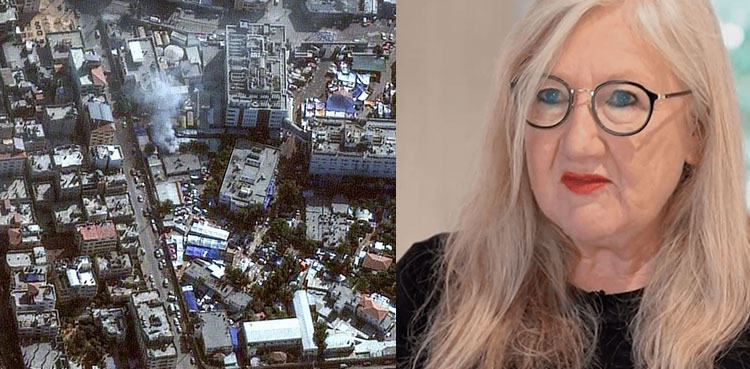
UNITED NATIONS: The World Health Organization (WHO) Tuesday expressed concern for hundreds of thousands of Palestinians displaced by the deadly Israeli attacks in the besieged Gaza where heavy rainfall has caused flooding and aggravated the already dire health crisis.
“Rain will just add further to the suffering” of people in the Strip, WHO Spokesperson Margaret Harris told reporters in Geneva, at a time when disruptions in sewage pumping and water shortages have caused a spike in waterborne diseases and bacterial infections.
The World Health Organization warned last week that since mid-October, over 33,500 cases of diarrhoea had been reported, mostly among children under five, some 16 times the monthly average.
Related: Gaza’s health system ‘on its knees,’ warns WHO chief
Facilities run by the UN agency for Palestine refugees, UNRWA, where over 580,000 displaced people in southern Gaza had sought shelter due to Israel’s offensive in retaliation for Hamas’ October 7 attacks, are more than nine times over capacity and the overcrowding is posing further health risks.
“We are begging for a ceasefire to happen now,” Dr. Harris insisted.
Meanwhile in Geneva, the families of some of the 238 hostages held by Hamas in Gaza since October 7 were due to continue their advocacy for the release of their loved ones on Tuesday.
A meeting was announced between hostages’ families and Mirjana Spoljaric, President of the International Committee of the Red Cross (ICRC), a UN humanitarian partner organization.
Related: Gaza hospital director says 179 buried in ‘mass grave’ in compound
In a statement, the ICRC said that Ms. Spoljaric would also meet with the Israeli authorities and that the organisation had been “persistently advocating on behalf of the hostages held in Gaza, including directly with Hamas and with actors who may have influence on the parties”.
WHO’s Dr Harris described in detail the dire situation at Al-Shifa Hospital, which is a focus of operations by the Israeli Defence Forces which claim that Hamas had established a command centre under the hospital – an allegation denied by medical staff.
Speaking of the “heroic” health workers, Dr Harris said that they were “doing whatever they can to keep going” while the facility had been without power since November 11 and there was not enough food and clean water. Some 700 patients were still present at the site and more than 400 health staff, in addition to around 3,000 displaced persons who had sought refuge there.
Dr Harris said that 20 patient deaths have been reported in the last 48 hours.
Related: Premature babies in grave peril at Gaza’s Al Shifa hospital
Meanwhile, news reports on Tuesday morning indicated that the Israeli military offered to provide incubators to the Al-Shifa Hospital, where 36 premature babies require constant care. As many as six premature babies had reportedly died over the past three days as their incubators were unable to function owing to the lack of electricity.
Asked about the possibility of evacuating patients, Dr. Harris explained that all of those remaining at Al-Shifa required critical support to stay alive. Moving them “would be a very difficult thing to ask in the best circumstances”, Dr. Harris said, let alone amid bombing, armed clashes and a lack of fuel for ambulances.
“The best way would be to stop the hostilities right now and focus on saving lives, not taking lives,” she insisted.
Some 135 attacks on health facilities have been documented in Gaza over the course of the past month, and WHO’s Dr Harris said that it was the highest number recorded in such a short amount of time.
“I hope this is the worst we ever see,” she said. The WHO spokesperson pointed to an “increasing trend” of attacks on health care, also seen in other ongoing conflicts in Sudan and in Ukraine.
“It seems that somehow the understanding that a hospital must be a safe haven, a place where people come to be treated when they are in need, has been forgotten,” she told journalists.
from Health News - Latest breaking Health News - ARY NEWS https://ift.tt/FKfsiwl


0 Comments